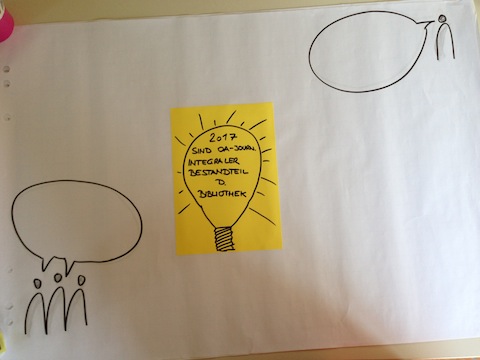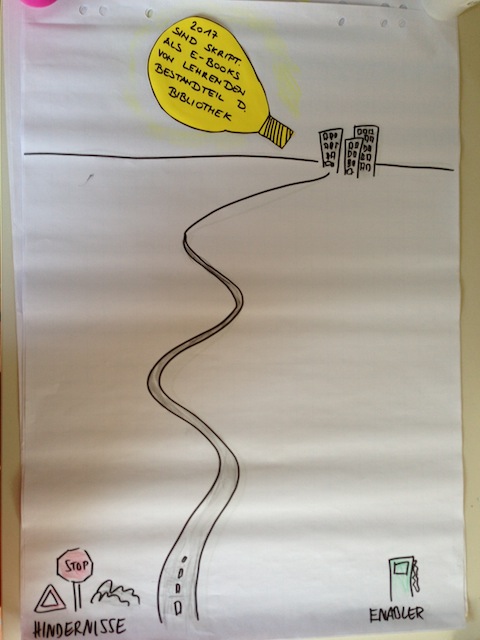Im Rahmen der Campus Innovation Konferenz in Hamburg hab ich über das Themenfeld Learning Analytics geredet. In diese Zusammenhang berichtet ich auch über den Mathetrainer (mehr gibt es dazu im unserem Weblog). Die Folien sind bereits hier veröffentlicht, die Aufzeichnung von meinem iPad nun jetzt:
[workshop] Ebooks im Spannungsfeld Hochschule – Wohin geht die Reise?
Endlich ist es soweit – heute findet unsere iUNIG-Tagung zum Thema „Warum E-Books (nicht) funktionieren“ statt und neben einigen Moderationstätigkeiten werde ich zusammen mit Eva Bertha (Bibliotheksleitung TU Graz) einen Workshop abhalten.
Hier vorab einmal das Workshopdesign:
***************************************
Titel: Ebooks im Spannungsfeld Hochschule – Wohin geht die Reise?
- Kurzpräsentation Bibliothek TU Graz zum Thema E-Books (Fr. Bertha)
- Kurzpräsentation E-Learning TU Graz (Ebook-Erstellung der Abteilung; Open-Access-Zeitschriften)
- Präsentation folgender Visionen:
- 2020 ist die erste papierlose Bibliothek an einer Hochschule Realität
- 2017 sind Open-Access-Zeitschriften integraler Bestandteil der Bibliotheken
- 2017 sind Open Educational Resources in Universitäten etabliert (Studierende geben kein Geld für Unterlagen aus)
- 2017 sind Skripten als E-Books von Lehrenden Bestandteil der Bibliothek
- Gruppenbildung zu max. 4-6 Personen (3-4 Gruppen)
- ThinkTank-Methode: Konkretisieren, was beim Erfüllen der Vision erfüllt passiert ist – Wie verändert sich die Welt? Wie reagieren z.B. die Interessengruppen, die Lernenden, die Welt darauf?

- Roadmapping-Methode: Blick „zurück“: Wie kam es dazu, dass sich die Vision erfüllte? Welche Hindernisse gab es, welche Ermöglicher?

- Präsentation der Ergebnisse je Gruppe
***************************************
Ich hoffe natürlich, dass es den TeilnehmerInnen viel Spaß macht, an diesen Visionen zu arbeiten und freu mich schon auf die Ergebnisse. Dokumentation folgt 🙂 .
[thesis] Evaluation of Frameworks for Desktop-Like Web Applications in Pure JavaScript
Thomas did his masterthesis about the „Evaluation of Frameworks for Desktop-Like Web Applications in Pure JavaScript„. Beside his great work I like to congratulate him again to his spectacular defense. Here are the slides of his presentation:
Klicken Sie auf den unteren Button, um den Inhalt von de.slideshare.net zu laden.
[presentation] Intelligenter 1×1-Trainer
Das Netidee-Projekt „Intelligenter 1×1-Trainer“ ist fertiggestellt und wir blicken auf einen erfolgreichen Projektverlauf zurück. Im Rahmen des Abschlussevents berichtet Martin Schön über die Eckdaten:
Klicken Sie auf den unteren Button, um den Inhalt von de.slideshare.net zu laden.
[presentation] Learning Analytics am Beispiel des Mathetrainers
Im Rahmen der Campus Innovation Tagung wurde ich eingeladen rund um das Thema Learning Analytics zu reden. Dem komm ich natürlich gerne nach und werde auch über unsere Erfahrungen zum Einmaleins-Trainer berichten.
Hier die Folien:
Klicken Sie auf den unteren Button, um den Inhalt von de.slideshare.net zu laden.
[podcast] Kooperation durch Medien – Alte Methoden neu gedacht?
Die Aufzeichnung meines Vortrages über „Kooperation durch Medien – Alte Methoden neu gedacht?“ an der VHS Meidling ist nun online verfügbar. Wie immer freue ich mich über Rückmeldungen. Die Folien sind bereits hier publiziert.
[presentation] A Development of a Taxonomy for the Use of Tablets in Schools
Sabrina did her masterthesis about „iPads in the classroom„. Her great thesis is available in the Amazon-Store. Furthermore this are the slides of her master defense. Thanks for your great job:
Klicken Sie auf den unteren Button, um den Inhalt von de.slideshare.net zu laden.
[presentation] Kooperation durch Medien – Alte Methoden neu gedacht?
Im Rahmen der Fachtagung „Die Gruppe als Potenzial für gelungenes Lernen – Impulse für Lernsettings“ an der VHS Meidling halt ich einen Vortrag zu „Kooperation durch Medien – Alte Methoden neu gedacht?“. Die Folien hierzu sind online:
Klicken Sie auf den unteren Button, um den Inhalt von de.slideshare.net zu laden.
[tool] PUMO – Publication Monitoring
PUMO unser Monitoring-Tool wurde gründlich überarbeitet. Neben neuen zusätzlichen statistischen Anzeigen, gibt es nun die Möglichkeit sich diese in seiner eigenen Webseite einzubetten.
Weiters haben wir neben Slideshare, Scribd und Youtube auch Mendely mitaufgenommen. Also einfach Account anlegen, die URLs eingeben, die man beobachten möchte und danach zurücklehnen und warten – den Rest erledigt PUMO 🙂 .
Hier ein Beispiel – unser Film „Technologien aus Sicht von Kindern„:
Klicken Sie auf den unteren Button, um den Inhalt von pumo.tugraz.at zu laden.
[presentation] Semantic Recommandation Sytems for Research 2.0
Patrick Thonhause hat im Rahmen seiner Masterarbeit das Thema „Semantic Recommandation Sytems for Research 2.0“ behandelt – hier gibt es die Folien seiner Masterverteidigung.
Klicken Sie auf den unteren Button, um den Inhalt von de.slideshare.net zu laden.
